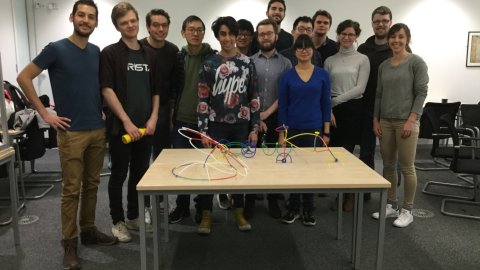This meeting is being held in celebration of Prof Philip Maini's 60th birthday. Prof Maini has been an internationally leading researcher in mathematical biology for decades. He is currently the Director of the Wolfson Centre for Mathematical Biology, a position he has held since 1998. In the past 20 years he has grown the group significantly. He has established countless interdisciplinary collaborations, has over 400 publications in numerous areas of mathematical biology, with major contributions in mathematical modelling of tumours, wound healing and embryonic pattern formation. He has been elected Fellow of the Royal Society (FRS), Fellow of the Academy of Medical Sciences (FMedSci), and Foreign Fellow of the Indian National Science Academy (FNA). He has served or is serving on editorial board of a large number of journals, and was Editor-in-Chief of the Bulletin of Mathematical Biology [2002-15]. And yet his service to the community cannot be captured just by numbers and titles. Anyone who has met him and worked with him cannot but notice and be touched by his unfailing generosity and the many sacrifices he has made and continues to make day in and day out to help students, early career researchers, and fellow faculty alike.
This meeting provides an opportunity to celebrate Prof Maini's many accomplishments; to thank him for all of his sacrifices; and to bring together the large number of researchers – mathematicians, biologists, physiologists, and clinicians – that he has worked with and interacted with over the years. More broadly, the meeting provides a unique opportunity to reflect on mathematical biology, to provide perspectives on the trajectory of a field that was scarcely recognised and had very few dedicated researchers in the days of Prof Maini's own DPhil; yet a field that has grown tremendously since then. Much of this growth is attributable to the work of Prof Maini, so that today the value of mathematics in biology is increasingly recognized by biologists and clinicians, and with theoretical predictions of mathematical models having cemented a role in advancing biological understanding.
Speakers
David Sumpter, Uppsala University (Public lecture), Derek Moulton, University of Oxford, Hans Othmer, Minnesota University, Jen Flegg, University of Melbourne, Jim Murray, University of Washington, Jonathan Sherratt, Heriot-Watt University, Kevin Painter, Heriot-Watt University, Linus Schumacher, University of Edinburgh, Lucy Hutchinson, Roche, Mark Chaplain, University of St Andrews, Mark Lewis, University of Alberta, Mary Myerscough, University of Sydney, Natasha Martin, University of Bristol, Noemi Picco, Swansea University, Paul Kulesa, Stowers Institute for Medical Research, Ruth Baker, University of Oxford, Santiago Schnell, University of Michigan, Tim Pedley, University of Cambridge
Organising committee
Ruth Baker (University of Oxford)
Derek Moulton (University of Oxford)
Helen Byrne (University of Oxford)
Santiago Schnell (University of Michigan)
Mark Chaplain (University of St Andrews)


